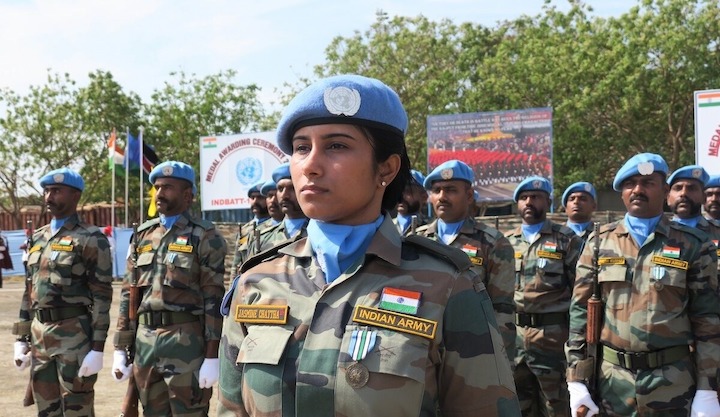The International Day of Peace, observed annually on September 21st, is a momentous occasion to reflect on the importance of peace and its significance in a world fraught with conflicts, tensions, and unrest. Established by the United Nations (UN) in 1981, this day serves as a global reminder of the imperative to strive for a more peaceful and harmonious world. One of the critical aspects of maintaining international peace and security is the role of the UN’s peacekeeping force, which plays a vital role in resolving conflicts and preventing the escalation of violence worldwide. India, as a staunch advocate for peace and an active participant in peacekeeping missions, has made substantial contributions to this endeavour.
The Role of UN’s Peacekeeping Force
The United Nations’ peacekeeping force is an integral component of its efforts to maintain international peace and security. These missions are typically deployed in conflict zones or areas where tensions threaten to boil over into violence. The primary objectives of UN peacekeeping missions include:
1. Conflict Prevention and Resolution: UN peacekeepers aim to prevent the outbreak of violence by acting as a buffer between conflicting parties and facilitating dialogue and negotiations. In cases of ongoing conflicts, they work towards finding peaceful resolutions and ceasefires.
2. Protection of Civilians: Ensuring the safety and well-being of civilians caught in the crossfire is a paramount responsibility of UN peacekeepers. They provide humanitarian assistance, create safe zones, and protect vulnerable populations.
3. Disarmament and Demobilization: In post-conflict scenarios, peacekeepers assist in disarmament and demobilization efforts, helping combatants transition into civilian life and reintegrate into society.
4. Monitoring and Reporting: Peacekeeping missions closely monitor adherence to ceasefire agreements and report violations, contributing to the international community’s understanding of the situation on the ground.
5. Electoral Assistance: UN peacekeepers often support the organization of free and fair elections in post-conflict countries to ensure the establishment of stable and legitimate governments.
6. Capacity Building: They also work on strengthening the capacity of local institutions and law enforcement agencies to maintain peace and security in the long term.
India’s Contribution to UN Peacekeeping Force and Missions
India’s role in United Nations (UN) peacekeeping missions stands as a testament to its unwavering dedication to global peace and stability. Some notable aspects of India’s involvement in UN peacekeeping include:
1. Historic Participation and Large Contingents
India has held the distinction of being the largest troop contributor to UN missions since their inception. With a record of participating in 49 peacekeeping missions, India’s total contribution exceeds a staggering 1,95,000 troops, in addition to a substantial number of deployed police personnel. This remarkable commitment solidifies India’s position as a global leader in supporting UN peacekeeping efforts.
2. Leadership Roles and Diplomatic Engagement
India’s involvement extends beyond troop deployments. It boasts a rich history of providing 15 Force Commanders in various UN Missions, showcasing its military expertise and leadership. Presently, Maj Gen Jai Shanker Menon, VSM serves as the Force Commander in UNDOF (Golan Heights). India also had the honour of contributing two Military Advisors and One Deputy Military Advisor to the Secretary General of the United Nations, along with two Divisional Commanders and seven Deputy Force Commanders.
Moreover, the Indian Army has contributed lady officers as Military Observers and Staff Officers, demonstrating a commitment to gender equality in peacekeeping. India’s diplomatic endeavours complement these efforts, working toward building international consensus on peace and security issues, promoting dialogue among conflicting parties, and actively engaging in diplomatic peace processes.
3. Humanitarian Assistance and Gender Equality
India’s contributions encompass not only military personnel but also vital humanitarian assistance. Indian peacekeeping missions often feature medical and engineering units that provide invaluable support in conflict zones. These units have played a pivotal role in constructing essential infrastructure and delivering crucial medical aid to regions affected by conflict, exemplifying India’s multifaceted approach to peacekeeping.
India’s commitment to gender equality is evident in its deployments of female peacekeepers, promoting active participation in peace and security efforts. Notably, India deployed the first all-women contingent in a peacekeeping mission, a Formed Police Unit, to the UN Operation in Liberia (UNMIL) in 2007.
4. The Ultimate Sacrifice
While India’s commitment to UN peacekeeping is commendable, it has come at a significant cost. In the pursuit of global peace, 168 Indian soldiers have made the supreme sacrifice, laying down their lives while serving under the blue flag. These brave individuals exemplify the selfless commitment of Indian peacekeepers to the cause of global peace and stability, and their sacrifices must not be forgotten.
The International Day of Peace serves as a stark reminder of the crucial role played by the UN’s peacekeeping force in maintaining global peace and security. These missions have made significant strides in preventing conflicts, protecting civilians, and aiding in post-conflict reconstruction. India’s unwavering commitment to peacekeeping efforts is evident in its substantial contributions, both in terms of personnel and resources. As we commemorate this day, let us acknowledge the essential work of UN peacekeepers worldwide and appreciate the efforts of countries like India in fostering a more peaceful world. Ultimately, it is through collective international action that we can aspire to achieve lasting peace and prosperity for all.


